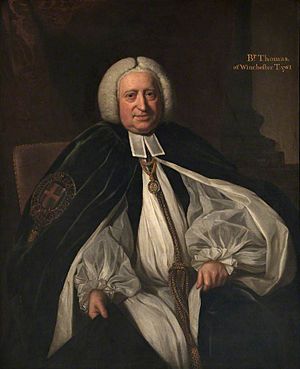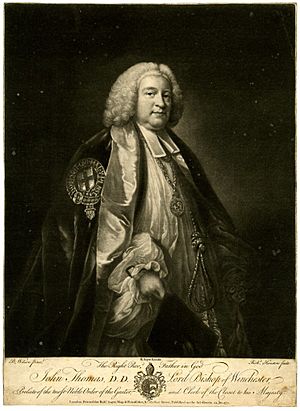John Thomas (bishop of Winchester) facts for kids
Quick facts for kids John Thomas |
|
|---|---|
| Bishop of Winchester | |

1761 portrait by Nathaniel Dance-Holland
|
|
| Diocese | Diocese of Winchester |
| In Office | 1761–1781 (d.) |
| Predecessor | Benjamin Hoadly |
| Successor | Brownlow North |
| Other posts |
|
| Orders | |
| Consecration | 4 October 1747 |
| Personal details | |
| Born | 17 August 1696 |
| Died | 1 May 1781 (aged 84) Winchester House, Chelsea, Middlesex, Great Britain |
| Nationality | English |
| Denomination | Anglican |
| Alma mater | Keble College, Oxford |
John Thomas (born August 17, 1696 – died May 1, 1781) was an important English bishop. He served in the Church of England during the 1700s.
He went to Charterhouse School and then Christ Church, Oxford. He earned his Master of Arts degree in 1719. The next year, he became a Fellow at All Souls College, Oxford.
John Thomas became the Bishop of Peterborough in 1747. Later, in 1752, he was chosen to teach the young Prince of Wales, who would become King George III. In 1757, he became the Bishop of Salisbury. Finally, in 1761, he was made the Bishop of Winchester, a very important position.
Contents
John Thomas's Journey to Bishop
John Thomas was born in Westminster on August 17, 1696. His father, Stremer Thomas, was a colonel in the Guards Regiment. John attended Charterhouse School, which is a famous school in England.
After school, he went to Christ Church, Oxford, a well-known university. He studied hard and earned several degrees. In 1720, he became a Fellow at All Souls' College.
Early Career in the Church
After college, John Thomas worked as a curate in London. A curate is a priest who helps in a parish. His sermons, which are religious talks, became very popular. People noticed his talent for preaching.
In 1731, he was given a special role at St Paul's Cathedral. This is a very famous church in London. He also became the rector of a church called St. Bene't and St. Peter, Paul's Wharf in 1733. He kept this job until 1757.
In 1742, he became a canon at St Paul's, another important church role. Around this time, he also became one of King George II's chaplains. A chaplain is a minister who serves a royal family or a group.
Becoming a Bishop
John Thomas had gained the favor of the king. Because of this, he was given the chance to become a bishop. On October 4, 1747, he was officially made a bishop at Lambeth Palace. His first role as bishop was for the area of Peterborough.
In 1752, John Thomas was chosen for a very special job. He became the teacher, or "preceptor," for the young Prince of Wales. This prince would later become King George III. This was a significant role, as he helped educate the future king.
Moving to Higher Roles
In 1757, John Thomas moved to a new position. He became the Bishop of Salisbury. This role also made him the Chancellor of the Order of the Garter. This is a very old and important order of knights in England.
His final move was in 1761, when he became the Bishop of Winchester. This was one of the most important bishop roles in England. He took over from another famous bishop, Benjamin Hoadly.
John Thomas passed away on May 1, 1781, at Winchester Palace. He was buried in Winchester Cathedral. There are paintings of him at Salisbury and Lambeth palaces. There is also an old engraving of him from 1771.
John Thomas's Published Works
John Thomas wrote and published about ten works during his lifetime. Most of these were sermons, which are religious speeches.
John Thomas's Family
John Thomas was married to Susan Mulso. Her brother, Thomas Mulso, married John Thomas's sister. This meant their families were closely connected. Susan Thomas passed away in 1778.
John and Susan had three daughters:
- Susanna Thomas, who married Newton Ogle, who was the Dean of Winchester.
- Anne Thomas, who married William Buller, who became the Bishop of Exeter.
- Hester Thomas, who married Rear Admiral Sir Chaloner Ogle, 1st Baronet.

 | Chris Smalls |
 | Fred Hampton |
 | Ralph Abernathy |

